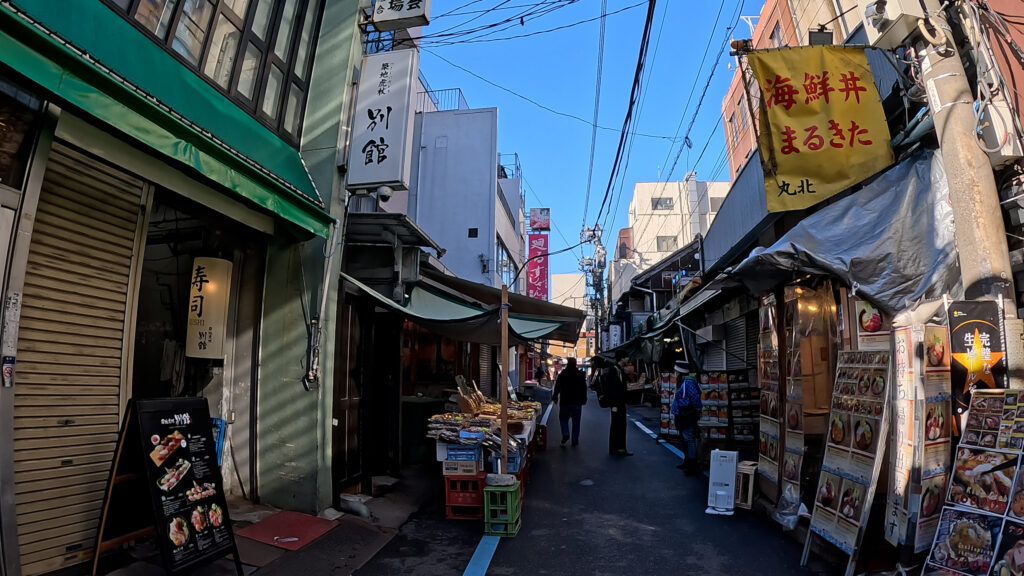A Dawn Adventure: My Visit to Tsukiji Fish Market
As the first hints of dawn broke over Tokyo’s skyline, I found myself navigating the city’s eerily quiet streets. My destination: the world-famous Tsukiji Fish Market. Despite my jetlag, excitement coursed through my veins, propelling me forward through the cool morning air.

Arriving at Tsukiji
I reached the outer market just as vendors were setting up their stalls. The air was thick with anticipation and the unmistakable scent of the sea. Fishmongers arranged their wares with practiced precision, creating vibrant displays of marine life that would soon attract throngs of locals and tourists alike.
As I wandered through the narrow alleys, I marvelled at the sheer variety of seafood on offer. Glistening tuna steaks, writhing octopuses, and mounds of tiny silver fish I couldn’t name filled every available surface. The cacophony of voices haggling over prices in rapid-fire Japanese added to the sensory overload.
Back to the Outer Market
Returning to Tsukiji’s outer market, I was ready for breakfast. The area surrounding the market is a food lover’s paradise, with dozens of small restaurants and food stalls catering to every taste. I joined the queue at a tiny sushi bar, where the chef’s nimble fingers crafted each piece with reverence.
The sushi melted on my tongue – so fresh it seemed to have leapt from the sea onto my plate. Briny sea urchin, buttery toro, and sweet, plump shrimp were among the highlights. As I savoured each morsel, I chatted with my fellow diners – a mix of locals starting their day and bleary-eyed tourists like myself.
A Cultural Experience
What struck me most about Tsukiji wasn’t just the incredible seafood, but the glimpse it offered into Japanese culture. The market embodied so many aspects I’d come to associate with Japan: the emphasis on quality and freshness, the respect for tradition alongside cutting-edge technology, and the efficient, almost choreographed way everyone went about their tasks.

I watched in awe as a vendor wielding a knife nearly as long as my arm filleted a massive tuna with surgical precision. Nearby, another merchant arranged delicate sea urchins in a pattern so artful it seemed a shame to disrupt it for a sale.
The Human Element
As the morning wore on and my initial sensory shock faded, I began to notice the human stories unfolding around me. Grizzled fishmongers bantered good-naturedly with regular customers. A young apprentice struggled to keep up with his mentor’s rapid-fire instructions. Restaurateurs haggled over prices, their livelihoods dependent on securing the best catch at the right price.
I struck up a conversation with an elderly woman selecting vegetables at a produce stall. Though our shared language was limited, her pride in explaining the proper way to prepare daikon radish transcended words. It was these small, human interactions that truly brought Tsukiji to life for me.
Reflections and Souvenirs
As the market’s frenetic pace began to slow in the late morning, I took a final stroll through the outer market. Souvenir shops offered everything from handcrafted knives to quirky fish-shaped keychains. I couldn’t resist purchasing a beautiful ceramic tea set, its delicate blue glaze reminiscent of the ocean’s depths.
Leaving Tsukiji, my senses were overwhelmed, my camera roll was full, and my feet ached. But more than anything, I felt a deep appreciation for this place that had been the beating heart of Tokyo’s culinary scene for so many decades.
While the inner market’s move to Toyosu marked the end of an era, the spirit of Tsukiji lives on in its outer market and the surrounding area. It remains a must-visit destination for any food lover or culture enthusiast traveling to Tokyo.
As I made my way back to my hotel, already planning a return visit, I realized that Tsukiji had given me more than just a memorable morning. It had offered a window into the soul of Tokyo – a city where tradition and modernity, commerce and craftsmanship, the sea and the metropolis all coexist in a beautiful, chaotic harmony.

